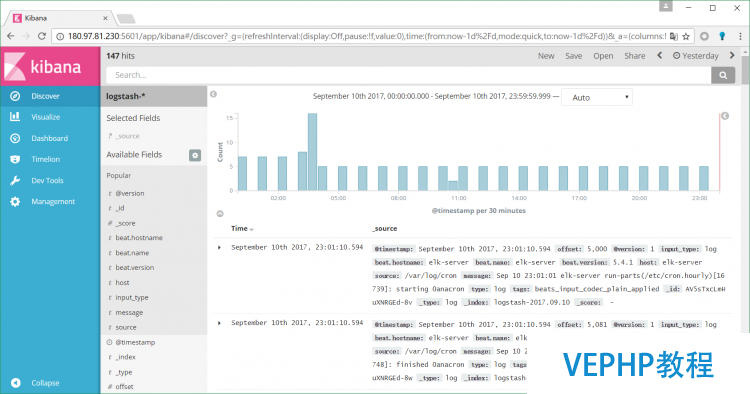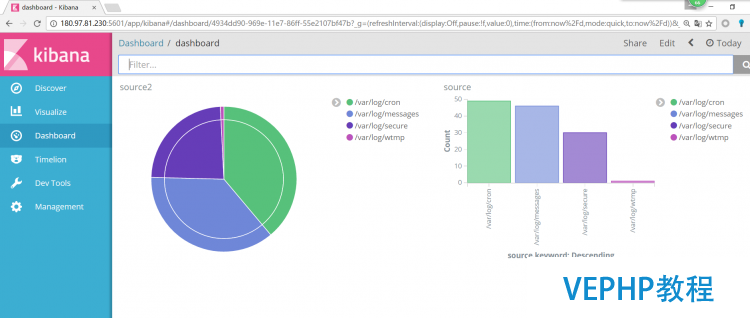LINUX教学:ELK自动安装脚本
作者:VEPHP 时间 2017-10-04
《LINUX教学:ELK自动安装脚本》要点:
本文介绍了LINUX教学:ELK自动安装脚本,希望对您有用。如果有疑问,可以联系我们。
一、简介
ELK由Elasticsearch、Logstash和Kibana三部门组件组成;
Elasticsearch是个开源分布式搜索引擎,它的特点有:分布式,零配置,自动发现,索引自动分片,索引副本机制,restful风格接口,多半据源,自动搜索负载等.
Logstash是一个完全开源的工具,它可以对你的日志进行收集、阐发,并将其存储供以后使用
kibana 是一个开源和免费的工具,它可以为 Logstash 和 ElasticSearch 提供的日志分析友好的 Web 界面,可以赞助您汇总、分析和搜索重要数据日志.
二、焦点组件
Logstash: logstash server端用来搜集日记;
Elasticsearch: 存储各种日志;
Kibana: web化接口用作查寻和可视化日记;
Filebeat是一个日志文件托运工具,在你的服务器上安装客户端后,filebeat会监控日志目录或者指定的日志文件,追踪读取这些文件(追踪文件的变化,不停的读),而且转发这些信息到elasticsearch或者logstarsh中存放.
三、安装剧本
#!/bin/bash #mail:xuel@anchnet.com #data:2017/9/7 #AutoInstall ELK scripts #Software:elasticsearch-5.4.1/logstash-5.4.1/filebeat-5.4.1/kibana-5.4.1 clearecho "#############################################################################"
echo "# Auto Install ELK. ##"
echo "# Press Ctrl + C to cancel ##"
echo "# Any key to continue ##"
echo "# Softwae:elasticsearch-5.4.1/logstash-5.4.1/filebeat-5.4.1/kibana-5.4.1 ##"
echo "#############################################################################"
read -p 1
software_dir="/usr/local/software"
elasticsearch_url="https://artifacts.elastic.co/downloads/elasticsearch/elasticsearch-5.4.1.tar.gz"
kibana_url="https://artifacts.elastic.co/downloads/kibana/kibana-5.4.1-linux-x86_64.tar.gz"
logstash_url="https://artifacts.elastic.co/downloads/logstash/logstash-5.4.1.tar.gz"
filebeat_url="https://artifacts.elastic.co/downloads/beats/filebeat/filebeat-5.4.1-linux-x86_64.tar.gz"
sys_version=`cat /etc/RedHat-release |awk '{print $4}'|cut -d. -f1`
IP=`ip addr|grep "inet "|grep -v 127.0.0.1|awk '{print $2}'|cut -d/ -f1`
jvm_conf="/usr/local/elasticsearch/config/jvm.options"
sys_mem=`free -m|grep Mem:|awk '{print $2}'|awk '{sum+=$1} END {print sum/1024}'|cut -d. -f1`
#wget software wget_fun() { if [ ! -d ${software_dir} ];then
mkdir -p ${software_dir} && cd ${software_dir}
else cd ${software_dir}
fifor software in $elasticsearch_url $kibana_url $logstash_url $filebeat_url
do wget -c $software
doneclear} #initial system:install java wget;set hostname;disable firewalld init_sys() { [ -f /etc/init.d/functions ] && . /etc/init.d/functions
[ "${sys_version}" != "7" ] && echo "Error:This Scripts Support CentOS7.xx" && exit 1
[ $(id -u) != "0" ] && echo "Error: You must be root to run this script" && exit 1
sed -i "s/SELINUX=enforcing/SELINUX=disabled/" /etc/selinux/config
setenforce 0 yum install -y java-1.8.0-openjdk wget
hostnamectl set-hostname elk-server
systemctl stop firewalld cat >>/etc/security/limits.conf<<EOF
* soft nofile 65536 * hard nofile 65536 * soft nGproc 65536 * hard nproc 65536 EOF } #install elasticsearch install_elasticsearch() { cd $software_dir
tar zxf elasticsearch-5.4.1.tar.gz
mv elasticsearch-5.4.1 /usr/local/elasticsearch
mkdir -p /usr/local/elasticsearch/data /usr/local/elasticsearch/logs
useradd elasticsearch
chown -R elasticsearch:elasticsearch /usr/local/elasticsearch
echo "vm.max_map_count = 655360" >>/etc/sysctl.conf && sysctl -p
if [ ${sys_mem} -eq 0 ];then
sed -i "s#`grep "^-Xmx" ${jvm_conf}`#"-Xmx512m"#g" ${jvm_conf}
sed -i "s#`grep "^-Xms" ${jvm_conf}`#"-Xms512m"#g" ${jvm_conf}
else sed -i "s#`grep "^-Xmx" ${jvm_conf}`#"-Xmx${sys_mem}g"#g" ${jvm_conf}
sed -i "s#`grep "^-Xms" ${jvm_conf}`#"-Xms${sys_mem}g"#g" ${jvm_conf}
ficat >>/usr/local/elasticsearch/config/elasticsearch.yml<<EOF
cluster.name: my-application node.name: elk-server path.data: /usr/local/elasticsearch/data
path.logs: /usr/local/elasticsearch/logs
network.host: 127.0.0.1 http.port: 9200 discovery.zen.ping.unicast.hosts: ["elk-server"]
EOF su - elasticsearch -c "nohup /usr/local/elasticsearch/bin/elasticsearch &"
} #install logstash install_logstash() { cd $software_dir
tar -zxf logstash-5.4.1.tar.gz
mv logstash-5.4.1 /usr/local/logstash
cat>/usr/local/logstash/config/01-syslog.conf<<EOF
input { beats {
port => "5044"
}
}
output { elasticsearch {
hosts => "127.0.0.1:9200"
}
stdout { codec => rubydebug }
} EOF nohup /usr/local/logstash/bin/logstash -f /usr/local/logstash/config/01-syslog.conf & >/dev/null
} #install filebeat install_filebeat() { cd $software_dir
tar -zxf filebeat-5.4.1-linux-x86_64.tar.gz
mv filebeat-5.4.1-linux-x86_64 /usr/local/filebeat
cat >/usr/local/filebeat/filebeat.yml<<EOF
filebeat.prospectors: - input_type: log paths:
- /var/log/*.log
output.logstash: hosts: ["127.0.0.1:5044"]
EOF cd /usr/local/filebeat/
nohup /usr/local/filebeat/filebeat & >/dev/null
} #install kibana install_kibana() { cd $software_dir
tar -zxf kibana-5.4.1-linux-x86_64.tar.gz
mv kibana-5.4.1-linux-x86_64 /usr/local/kibana
cat >> /usr/local/kibana/config/kibana.yml <<EOF
server.port: 5601 server.host: "0.0.0.0"
elasticsearch.url: "http://127.0.0.1:9200"
EOF nohup /usr/local/kibana/bin/kibana & >/dev/null
} check() { port=$1 program=$2 check_port=`netstat -lntup|grep ${port}|wc -l`
check_program=`ps -ef|grep ${program}|grep -v grep|wc -l`
if [ $check_port -gt 0 ] && [ $check_program -gt 0 ];then
action "${program} run is ok!" /bin/true
else action "${program} run is error!" /bin/false
fi} main() { init_sys wget_fun install_elasticsearch install_filebeat install_logstash install_kibana echo -e "\033[32m Checking Elasticsearch...\033[0m"
sleep 20
check :9200 "elasticsearch"
echo -e "\033[32m Checking Logstash...\033[0m"
sleep 2
check ":9600" "logstash"
echo -e "\033[32m Checking Kibana...\033[0m"
sleep 2
check ":5601" "kibana"
action "ELK install is success!" /bin/true
echo "url:http://$IP:5601"
} main四、剧本安装
![N]I}LN%9I9M~XGPX0EE4[6R.png LINUX教学:ELK自动安装脚本](/public/uploads/modules/article/2017100513214770135.png)
安装完成拜访:http://IP:5601即可拜访
五、设置装备摆设
通过web界面拜访,创建index patterns
![4@ILZ]27{_TM6X}17$OR`JR.png LINUX教学:ELK自动安装脚本](/public/uploads/modules/article/2017100513214781762.png)
六、查看日记与dashboard


本文永远更新链接地址:
学习更多LINUX教程,请查看站内专栏,如果有LINUX疑问,可以加QQ交流咨询。
转载请注明本页网址:
http://www.vephp.com/jiaocheng/6557.html
同类教程排行
- LINUX入门:CentOS 7卡在开机
- LINUX实战:Ubuntu下muduo
- LINUX教程:Ubuntu 16.04
- LINUX教程:GitBook 使用入门
- LINUX实操:Ubuntu 16.04
- LINUX教学:Shell、Xterm、
- LINUX教程:Linux下开源的DDR
- LINUX实战:TensorFlowSh
- LINUX实操:Kali Linux安装
- LINUX教学:Debian 9 'St
- LINUX教学:openslide-py
- LINUX实战:Ubuntu下使用Vis
- LINUX教学:Linux 下 Free
- LINUX教学:通过PuTTY进行端口映
- LINUX教程:Ubuntu 16.04
